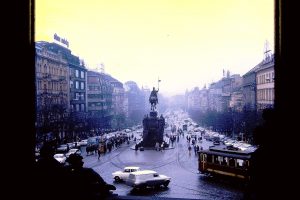
Wenceslas Square 1968
This week in August marks the Fiftieth Anniversary of two events in the tumultuous year of 1968 which had a lasting impact on my life: The Soviet invasion of Czechoslovakia on August 21st, and the Democratic National Convention in Chicago on August 26th. I had just graduated from UNC and turned 21. What follows is a personal post, using mostly my own photos.
The Warsaw Pact countries invaded Prague that week because the Czech leadership had dared to give their citizens a few freedoms (foreign newspapers, local elections, limited travel to the West) which were anathema to the ossified Communist Party elite in Moscow under Premier Leonid Brezhnev, who ruled the Soviet Union and its “satellite states” with an iron fist. Personal freedom was incompatible with the collective myth of communism and state control, and so it had to be crushed before the contagion spread east and infected others.
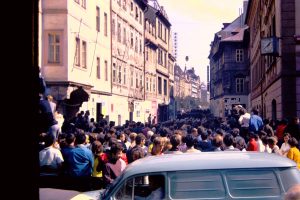
Prague
It would be twenty more years of repression before another Soviet leader, Mikhail Gorbachev, refused to use military power against similar cries for freedom from Estonia to Hungary, and the Soviet Union itself collapsed almost overnight, its foundation of lies, inconsistencies and corruption finally unable to prop itself up against the onslaught of truth.
My personal connection to that part of the world began that autumn, when I met Czech students trapped in London by the Soviet invasion, as I began two years of study at London School of Economics as a Marshall Scholar. Then I visited Bratislava and Prague in December, smuggling letters to my friends’ parents, and vice-versa (as a young male, I doubt I asked, “What can possibly go wrong with this plan, behind the Iron Curtain?”). I saw the bullet holes in the National Museum, and I became friends with young Czechs who had laid down in front of Soviet tanks, then argued with their crews. The following summer I spent a month in Leningrad in language school and returned to Prague for the first anniversary of the invasion, but those are slightly different stories which I may recount later.
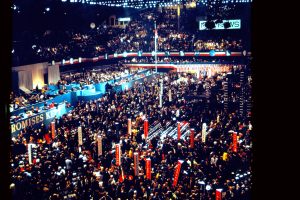
The 1968 Democratic National Convention
Returning to August, 1968, I was being drafted to fight in a war I didn’t believe in, Martin Luther King, Jr. and Robert Kennedy had been assassinated only a few months before, there were riots and destruction across many cities, and I lived in a state, Georgia, where there was no opposition party, the ruling Democratic party controlled all of the state apparatus, the Governor appointed all of the delegates to the national Democratic convention, and the entire ossified Democratic party elite remained in power to perpetuate the system of Jim Crow laws and the suppression of black people.
So there was no way for anyone who did not agree with those policies to engage the system to effect change. You couldn’t vote for anyone else in a state primary or election, and the Democratic Party itself was largely closed to anyone who did not agree with all of its policies in lock step (sound familiar?).
Thus the Georgia Challenge Delegation. In July Taylor Branch and I each contributed $25 to an account at the C&S Bank called “Georgians for a Democratic Convention”, and we went looking for others who shared our beliefs. We found them in the national campaign of Gene McCarthy, and in a few pro-Humphrey union leaders who also disagreed with Georgia’s racist governor.
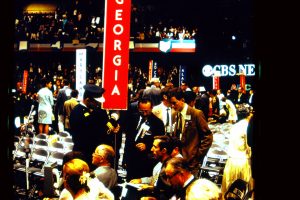
The Challenge Delegation is seated.
Taylor and I wound up as delegates to the Convention, and because I was young and large, Julian Bond and John Lewis asked me to lead the delegation down onto the floor when we were seated—there were rumors that the Maddox delegation was going to fight us.
In a post during our last election cycle I recounted the events in Chicago that summer and compared 1968 to 2016. Rather than repeat those conclusions here, I invite you to read that post.
If you trace the events and the threads of my life since then, the big strands are raising a family with my incredible wife, working in most facets of commercial real estate, becoming a believer, and writing novels. But also woven in not far from the surface are the strands of interest in and respect for the people of Russia and Eastern Europe, and of commenting on the intersection of politics, economics and faith. If you follow those strands back to their roots, 1968 was the key year.
Looking back from the vantage point of 50 years later, what are my observations? As an aside, if our nation was launched with the ratification of our Constitution in 1789, then I’ve been alive for almost one third of our country’s history. So either I’m really old, or our nation is really young, or both!
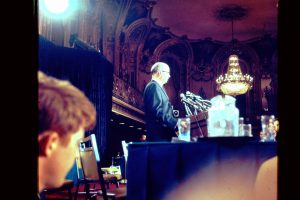
Lester Maddox’s press conference. Taylor watches.
1. One lesson I’ve observed starting those five decades ago is how powerful elites, whether in Moscow, Chicago or Atlanta in 1968, or in Washington in 2018, tend to perpetuate lies and try to rig the system to remain in power. That result is simply inevitable. Power almost always corrupts, even the best of us. That is why our Founding Fathers got it right by not believing in the ultimate perfection of man and a ruling class (as in France, Russia and Germany), but rather by believing in checks and balances between imperfect people and groups, who are free to pursue their own interests, while always constrained by others’ interests, in a free society protected by the rule of law. And assisted by a robust and agenda-free press which always investigates and upholds the actual truth.
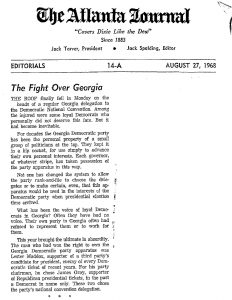 2. The truth and its free reign are indispensable to individual freedom, and vice-versa. In 1968, the Soviets could still jam Western radio and TV stations, and limit connections. By 1988, the fax machine had made the truth readily accessible across borders and within countries, and lies could no longer hold up. In the South, very few newspapers, thankfully including The Atlanta Journal and Constitution, had an editorial staff that stood up to the politicians of hate and their more violent also-rans. It took a lot of courage to challenge segregation and racism, but eventually and largely, though certainly not perfectly, that battle has been won.
2. The truth and its free reign are indispensable to individual freedom, and vice-versa. In 1968, the Soviets could still jam Western radio and TV stations, and limit connections. By 1988, the fax machine had made the truth readily accessible across borders and within countries, and lies could no longer hold up. In the South, very few newspapers, thankfully including The Atlanta Journal and Constitution, had an editorial staff that stood up to the politicians of hate and their more violent also-rans. It took a lot of courage to challenge segregation and racism, but eventually and largely, though certainly not perfectly, that battle has been won.
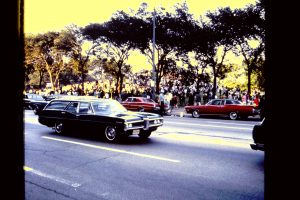
Protesters in Grant Park
3. Activism to right perceived wrongs is laudable and should always be encouraged. When the “system” provides no way to do so, more revolutionary paths are tried. How many violent demonstrators today watched how the Democratic Party rigged the 2016 results against Bernie Sanders and concluded that working within the system would never produce results? I readily admit that had there not been the opportunity to work on the Georgia Challenge Delegation in 1968, I might have been in the streets of Chicago that August; and though I am not a violent person, who knows what might have happened near me (as would be the case in Prague a year later)?
4. In the same way that active change must have a clear path in the system, no one should use either political power or violence to intimidate and silence others. None of the above works if we are not free to express ourselves. We applaud activism, not fascism. Not mobs of any stripe. Not shouting or intimidation. Neither liberty nor the truth have a chance without freedom of speech. We should particularly fight for the right to speak for those with whom we disagree, hoping for the same in return. By focusing on ideas rather than identities, we open potential paths for change (see this post).
5. 1968 was a terrible year, full of violence, change, war, and repression, with some hope at the very end. Daniel Hennigner has written an excellent summary of the events in “1968: The Year Politics Collapsed”. As an aside, he recounts that there were also three more notable college graduates that year: Bill Clinton, George W. Bush, and Donald Trump. Somehow we got through it. We didn’t have the 24/7 news cycle or the internet. We tuned in for thirty minutes (less with commercials) of national news each night at 7pm on one of the broadcast networks, perhaps read a local newspaper in the morning, and otherwise focused on our own lives and other issues. We didn’t marinate in agenda-driven “expert” opinion all day. Better? I’m not sure. But probably saner.
6. In my one man’s lifetime I have witnessed some amazing changes. In Leningrad in 1969 I saw Russian kids 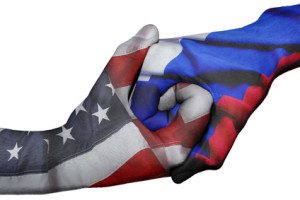 beaten up by the KGB just for talking with us. Then I lived through the hope and almost anarchic freedom of the early 90’s in Moscow, followed by the universal optimism of the early 2000’s, when every executive assistant expected one day to be the CEO, and now the repression, corruption and pessimism of today. People who say that one person cannot make a difference are wrong. And in the South, I remember riding the trolley bus downtown to watch a movie on a Saturday in the late 50’s and having a little old lady demand that the driver “stop the bus and tell the Negroes to move further to the back”. A few years later I gave a speech at our high school decrying the evils of segregation. A few years after that I was helping Julian Bond craft a speech at the DNC. And today, despite others’ opinions to the contrary, I believe most Southerners are color-blind in their relationships. An amazing transformation.
beaten up by the KGB just for talking with us. Then I lived through the hope and almost anarchic freedom of the early 90’s in Moscow, followed by the universal optimism of the early 2000’s, when every executive assistant expected one day to be the CEO, and now the repression, corruption and pessimism of today. People who say that one person cannot make a difference are wrong. And in the South, I remember riding the trolley bus downtown to watch a movie on a Saturday in the late 50’s and having a little old lady demand that the driver “stop the bus and tell the Negroes to move further to the back”. A few years later I gave a speech at our high school decrying the evils of segregation. A few years after that I was helping Julian Bond craft a speech at the DNC. And today, despite others’ opinions to the contrary, I believe most Southerners are color-blind in their relationships. An amazing transformation.
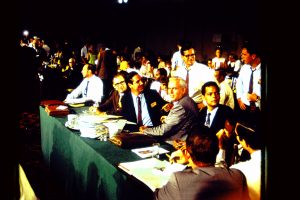
The Hearing at the Credentials Committee
7. Americans must always stand for at least three foundational principles: individual liberty, individual responsibility, and truth. They are what set us apart from most other countries. Other principles, like free speech, are assumed to be included. But in my fifty years of observing a few crucibles on this earth where the forces of evil and repression have been at work, I have concluded that these are the three bedrocks required for people to thrive, both individually and corporately.
8. In 1968 I was not a believer. I had thankfully attended church through high school and even been the head of the acolytes. But I had no personal relationship with my Savior, and so it was easy to fall away in college, as many of us do. I was full of myself, believing, as we would say today, my own press releases. It would take another sixteen years, several children, business setbacks, and personal failures to bring me to the end of myself, to realize that left to my own devices, our future was very dark. I tell the story of how God changed me in On The Edge, written, ironically, 25 years ago this fall, for another anniversary. It is hard to imagine how, had I been a believer in 1968, personal events would have been 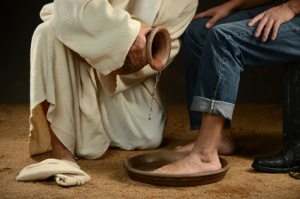 different. But I am sure that none of the points made above are even close in importance to the decision to give up trying to be the boss of my own life, and to turn it all over to God, which I did in 1984. One result has been a quiet joy, and the freedom to be myself, always allowing Him to work through me with the gifts and talents He has given me. If you haven’t considered that same decision yet, please give it a look. My current life and my eternity pivoted on the answer. And eternity is a lot longer than even fifty years.
different. But I am sure that none of the points made above are even close in importance to the decision to give up trying to be the boss of my own life, and to turn it all over to God, which I did in 1984. One result has been a quiet joy, and the freedom to be myself, always allowing Him to work through me with the gifts and talents He has given me. If you haven’t considered that same decision yet, please give it a look. My current life and my eternity pivoted on the answer. And eternity is a lot longer than even fifty years.
So those are my observations five decades to the week after the Soviet invasion of Czechoslovakia and the Chicago Democratic Convention. Who would have imagined, as we maneuvered around Chicago in our yellow school bus and I then headed to London a few weeks later, that I would be here today, alive and able to offer a few thoughts to those who come after. Only by His grace.

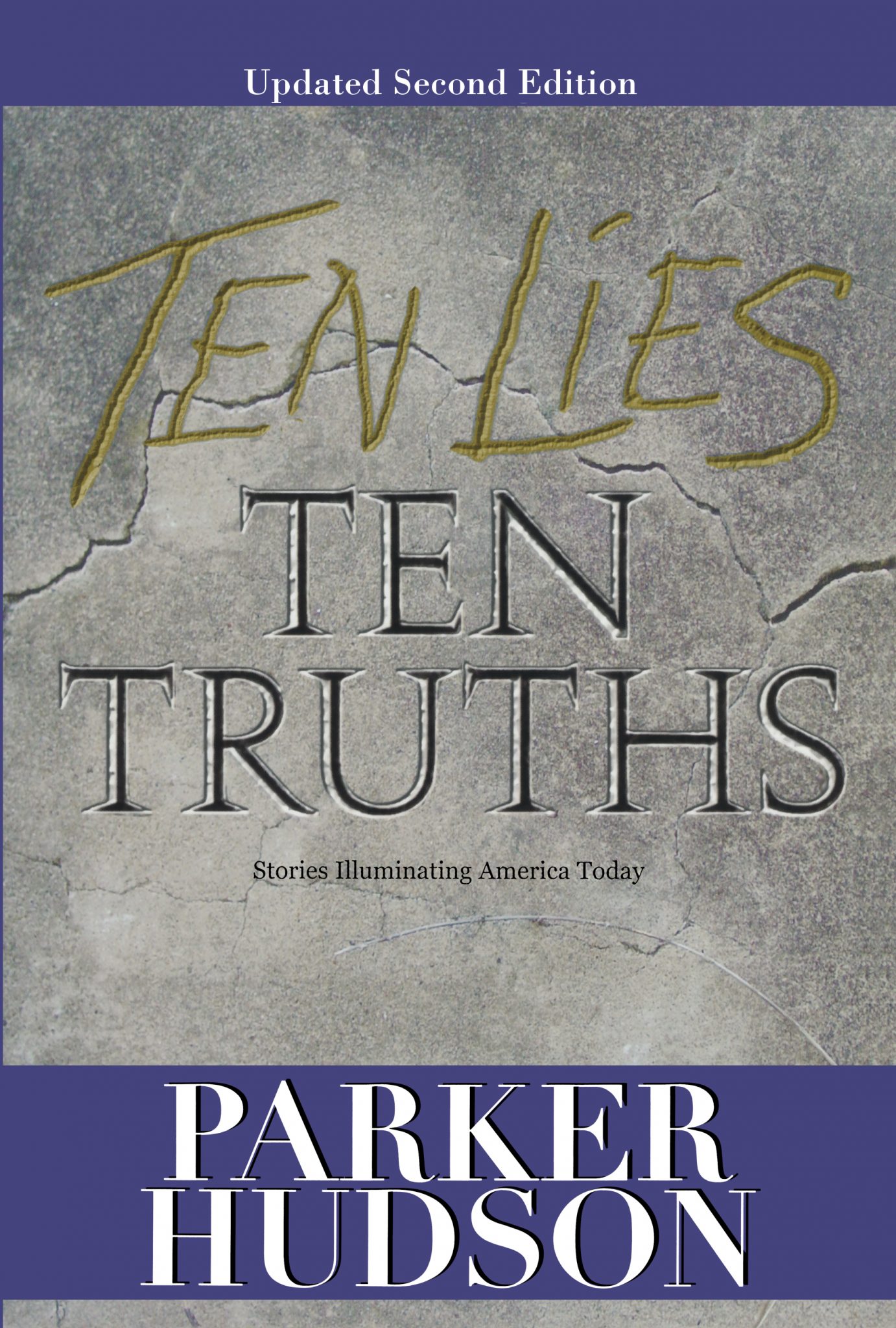
Comments